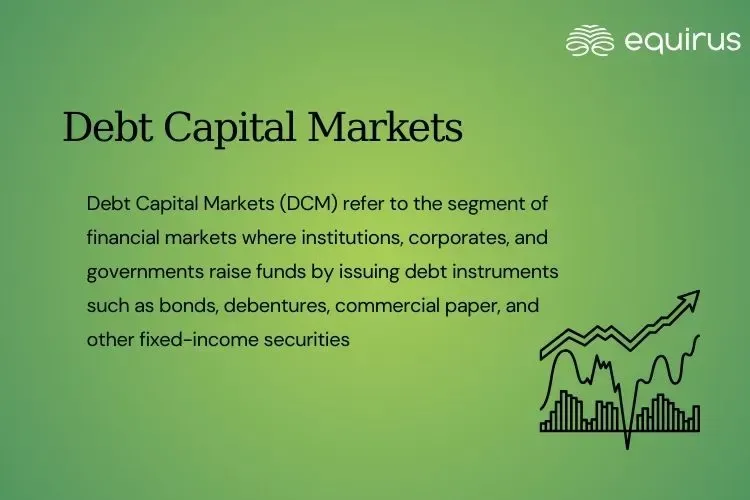Debt Capital Markets

Key Highlights
-
Debt Capital Markets (DCM) refer to the segment of financial markets where institutions, corporates, and governments raise funds by issuing debt instruments such as bonds, debentures, commercial paper, and other fixed-income securities.
-
Types of debt instruments in DCM includes corporate bonds, non-convertible debentures (NCDs), municipal bonds, securitised debt instruments, commercial paper (CP) and international debt offerings.
What is Debt Capital Markets?
Debt Capital Markets (DCM) refer to the segment of financial markets where institutions, corporates, and governments raise funds by issuing debt instruments such as bonds, debentures, commercial paper, and other fixed-income securities. DCM activities help borrowers secure medium- to long-term financing while providing investors with stable, income-generating opportunities.
Key Functions of DCM
DCM teams structure, price, and execute debt issuances in line with market conditions and regulatory frameworks. Their functions typically include:
-
Advising on Capital Structure: Evaluating funding needs and recommending optimal debt strategies.
-
Structuring Instruments: Designing debt products tailored to the borrower’s requirements - secured, unsecured, rated, or structured offerings.
-
Market Execution: Managing pricing, investor outreach, and placement of debt instruments.
-
Regulatory Coordination: Ensuring compliance with SEBI, RBI, and exchange regulations throughout the issuance.
Types of Debt Instruments in DCM
-
Corporate Bonds: Debt securities issued by companies to raise long-term capital, offering investors fixed or floating interest payments over a defined maturity period.
-
Non-Convertible Debentures (NCDs): Fixed-income instruments issued by corporates that cannot be converted into equity, typically offering higher yields in exchange for credit and liquidity risk.
-
Municipal Bonds: Debt securities issued by municipal bodies or urban local authorities to finance public infrastructure projects, often offering tax-efficient returns depending on regulatory provisions.
-
Securitised Debt Instruments: Structured instruments backed by a pool of financial assets such as loans or receivables where cash flows from the underlying assets are passed on to investors.
-
Commercial Paper (CP): Short-term unsecured debt issued by corporates or financial institutions to meet working capital requirements, generally issued at a discount and redeemed at face value.
-
International Debt Offerings: Rupee-denominated bonds issued in overseas markets, enabling Indian issuers to access global investors while mitigating foreign exchange risk on repayment.
Why DCM Matters for Issuers?
DCM enables organizations to:
-
Access Long-Term Funding at Competitive Rates
-
Diversify Funding Sources Beyond Banks
-
Optimise Capital Structure by balancing equity and debt
-
Enhance Liquidity Management through flexible issuance options
Why DCM Matters for Investors?
Investors benefit from:
-
Stable Cash Flows through interest payments
-
Portfolio Diversification by adding fixed-income exposure
-
Lower Relative Risk compared to equities
-
Access to Corporate and Government Credit Opportunities
